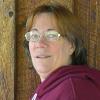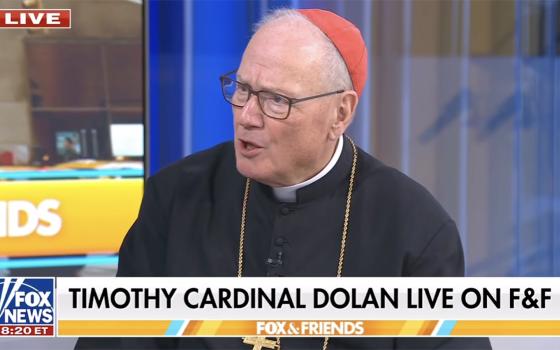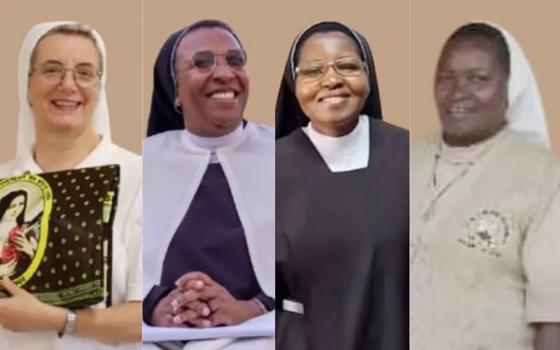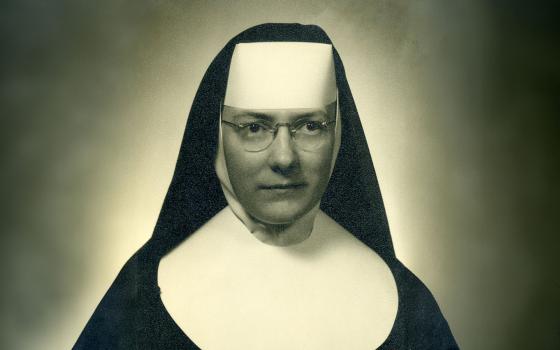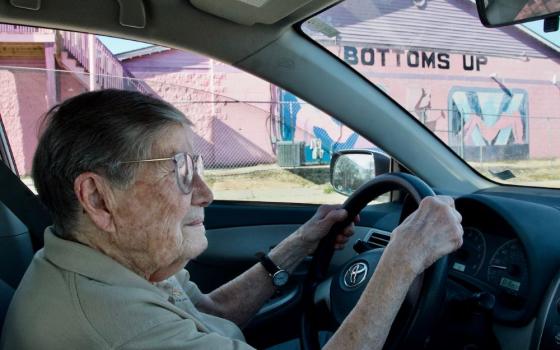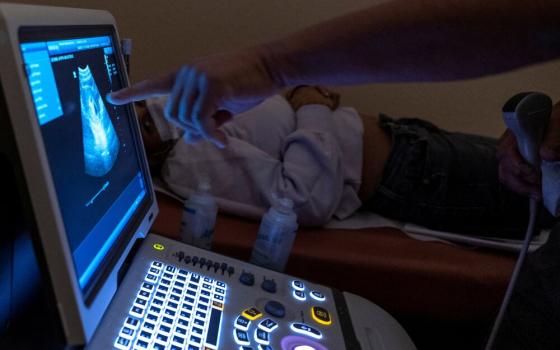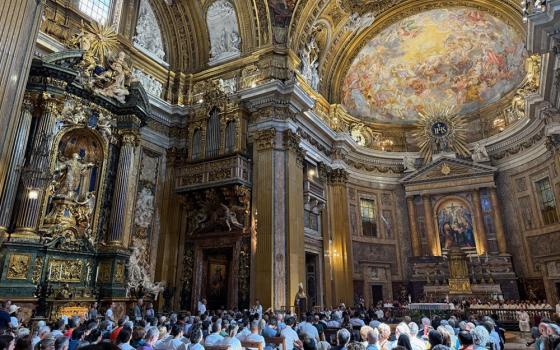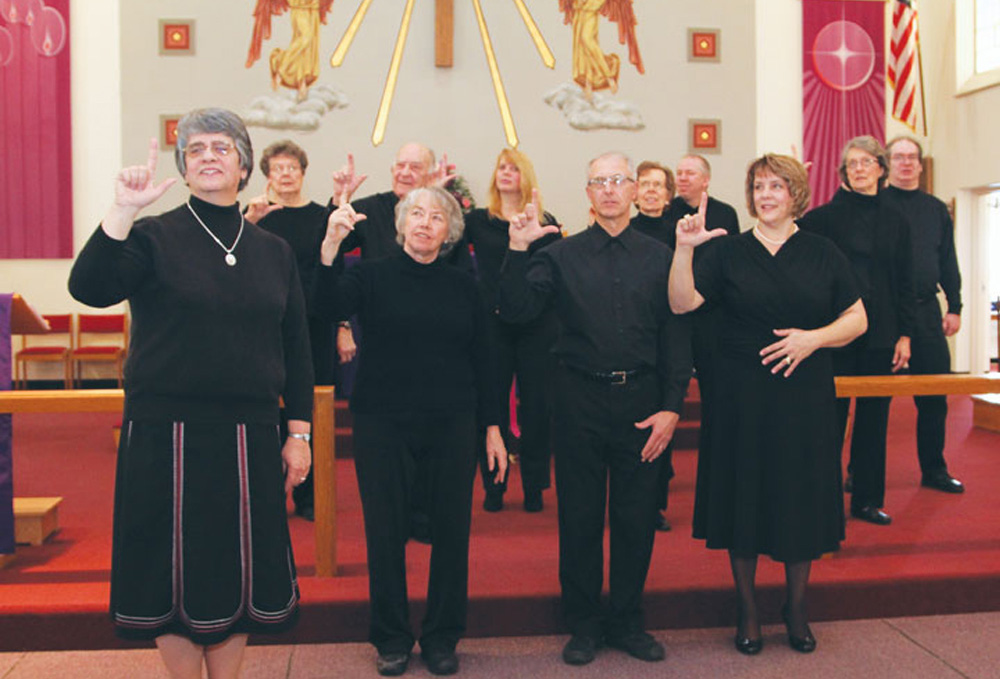
Sr. Conchetta LoPresti, left, signs "Lord" with the sign choir during a 2013 Mass at Resurrection Parish in Cheektowaga, New York. (Courtesy of Sisters of St. Francis of the Neumann Communities)
Sr. Conchetta LoPresti likes to talk with her hands. Since she's Italian, it comes naturally to her.
She grew up in Avalon, Pennsylvania, with a grandmother who didn't speak English. LoPresti didn't speak Italian, and her father — busy in the grocery store he ran — wasn't available to interpret for the two, so they communicated with body language and signs.
After LoPresti graduated from California University of Pennsylvania, she entered the Sisters of St. Francis of Millvale, Pennsylvania, in 1970. She will celebrate her 50th jubilee of profession this year.
LoPresti taught special education and students with multiple disabilities at the elementary level during her first 10 years as a sister and formally learned sign language to work with students who were deaf. Then, those in the deaf community invited her to continue her ministry with them. She was nervous at first but kept practicing the sign language.
"The deaf in western Pennsylvania are very patient, and they helped me to learn," she said.
At one point, she spent six months living on a sheep farm in Appalachia while serving as a counselor for Catholic Charities in southwestern Pennsylvania, but she missed her ministry with people who are deaf.
The merger of five Franciscan communities into the Sisters of St. Francis of the Neumann Communities in the mid-2000s brought her to New York state as the religious moved to their new regions. She currently serves as coordinator of deaf ministry for the Buffalo Diocese.
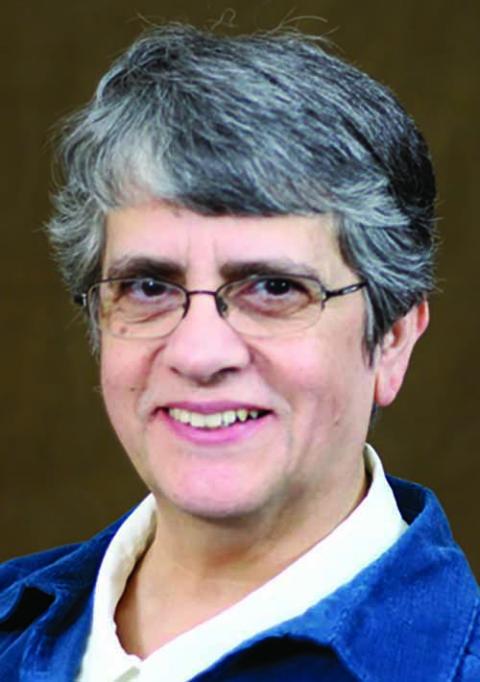
Sr. Conchetta LoPresti of the Sisters of St. Francis of the Neumann Communities (Courtesy of Sisters of St. Francis of the Neumann Communities)
"That means any deaf person in western New York that has something happening, they can call me and ask me to interpret for them," LoPresti said.
That includes interpreting the Mass on Sundays, a unique and beautiful experience, according to the hearing members of the congregation.
"People may be used to communicating through speaking," LoPresti said. "I do it with pictures in the air."
GSR: What is the most important aspect of your ministry?
LoPresti: Franciscans reach out to the marginalized. My whole thing is making the sacraments accessible. When I interpret the Mass, I become the Mass. The words come through me; the Scripture goes through me. Just to let it go through me is so cool.
A big part of the ministry is helping the deaf be part of the parish community. I was at a parish in Buffalo, and the priest I was working with had worked with the deaf for 40 years. We started together way back when. He retired two years ago.
The priest who took his place knew the deaf were there, and that was part of the deal: The deaf would be at that church. But he didn't care about them. He didn't want them. He wouldn't ever see me because he was too busy. He ignored the deaf, wouldn't even look at them in church. The sign choir wanted to sign for Christmas; he didn't want them to do it. I had to pressure him a little bit to get him to do that. It was really just pretty miserable.
Finally, right before COVID-19, I found another parish where they would actually welcome the deaf community. I was so thrilled. Then, everything froze.
In March 2021, I got to move to the new church. My office is almost unpacked. The priest and the people in the parish have been welcoming. What's even nicer is that our community of sisters has been at that parish since 1881.
To see a whole deaf group singing the Gloria is awesome. We have 20 to 40 deaf people each Sunday. For hearing people, to be in the midst of that, it's a nice experience of the reversal of what a deaf person goes through every day.
My delight is interpreting at church, interpreting the Mass and interpreting God's word.
What keeps you motivated in your ministry?
When St. Francis lived, he went around saying, "Good morning, good people." The people looked at him kind of strange, because the preaching in that day was hell and brimstone, "you're a terrible sinner," and all that.
Advertisement
I like to help people see the good in themselves and other people and celebrate that.
My background, when I started teaching, was in special education. It bothers me how everybody tells the students all the things they can't do instead of paying attention to all the things they can do. But there's gifts in each person.
Later, I worked as a counselor with people with mental illness. You don't feel too gifted when you're depressed or your world is kind of crazy. People with addictions, when they're trying to come out of an addiction, their feelings about themselves are pretty bad. They really have no clue what their gifts are because they usually started using before they discovered their gifts.
I've taught thousands sign language at this point. I've only had two people that couldn't learn it, and that's because they didn't have spatial perception.
I marvel that the sign for "peace" is to "become quiet." The sign for a blessing is to start at your mouth and bless the person. So somewhere along the line, working with the deaf, one morning when I was praying, it came to me that when I'm giving in whatever ministry I'm in, I reach a point that I have to become quiet. Then God fills me up, and I can become blessing.
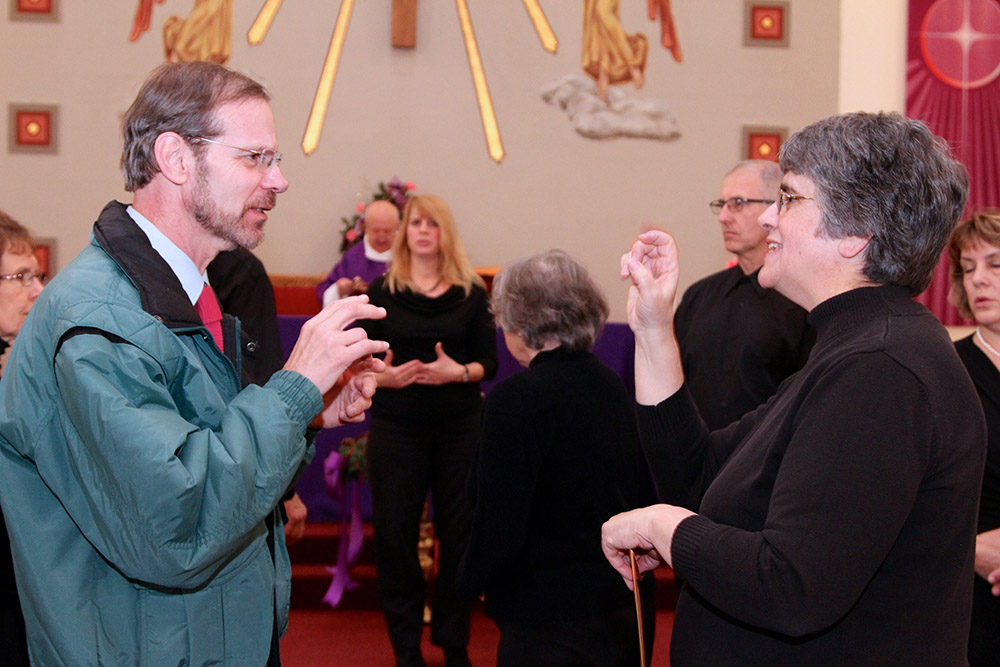
Sr. Conchetta LoPresti signs with a member of her congregation after a 2013 Mass. (Courtesy of Sisters of St. Francis of the Neumann Communities)
I'm on YouTube. I'm doing the stories of the 14 Holy Helpers, which is the parish we moved to. It's the only parish in the United States that's active that has that name. So I wouldn't have to repeat myself 15 times, I did a video that introduces me and introduces the 14 Holy Helpers and their stories. Then, I'm in these mini-videos, about two and a half minutes each, on each of the 14. I sign the story, then it's captioned.
I have a Facebook page — Buffalo Catholic Deaf — that has all kinds of stuff on it.
What are some other ways you've been able to help through your ministry?
For one thing, I was really glad my Franciscan community supported my ministry, even though it's one they never thought of before. Until I showed up, no one ever thought of deaf ministry. It's not a common thing. There aren't many of us around who do deaf ministry. The sisters are kind of amazed at it sometimes.
I help the sisters and other people understand how deafness isn't just something that was an inconvenience at school. It affects your whole life, all the little, everyday things people do. For example, I'm interpreting at the eye doctor because a patient has cataracts. If you're deaf, your eyes are really, really important. The last thing you want is something to happen to your eyes. You want to know what's going on, understand it and be able to have it explained. That's so important. Or it's a funeral, you have to make the arrangements, the funeral director doesn't know sign language and everybody in the family is deaf.
Now that I'm settled in at the parish, I'm starting to bring different sisters down with me on Sunday morning for the Mass so they can experience it.
